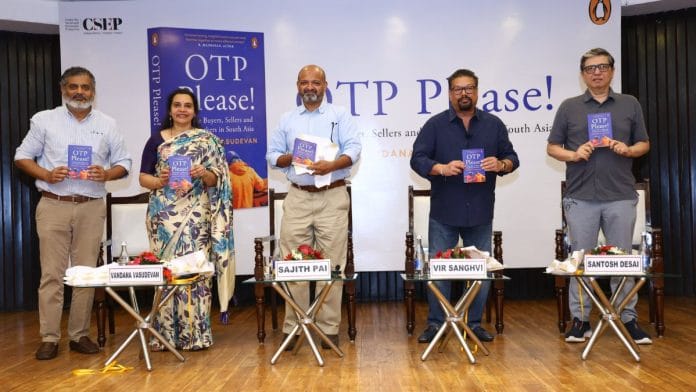New Delhi: While covering a protest staged by gig workers in Rajasthan, author Vandana Vasudevan met a delivery agent whose right thumb had been cut in half. It happened when he was helping a customer move their goods. He never got compensation or any medical assistance from Porter, the logistics startup he was working with.
This anecdote was among the many stories of gig workers that Vasudevan has chronicled in her newly-launched book ‘OTP Please!‘ It sheds light on gig economies in India and South Asia.
A star cast panel comprising author Santosh Desai, journalist Vir Sanghvi, and Sajith Pai of Blume Ventures launched Vasudevan’s book at the India International Centre on Thursday evening. The panel, moderated by Pai, discussed the intricacies of the book with humour, with every question carrying a small, witty quip.
“I will keep my questions long so I can put my point across too. I’m used to being a panelist, so this is how I’m going to have a say!” Pai said while effortlessly navigating the panel.
Vasudevan said she got the idea of writing her book during Covid-19, when the world was quiet and stationed in homes. It was the gig workers, the delivery agents standing at the gates of gated societies, always busy, ready to go for their next order.
“OTP Please is a one-of-a-kind book that offers an unprecedented study and analysis of South Asia’s growing gig economy. Where each of us plays a significant role in how this economy is shaping,” Archana Nathan, Senior commissioning editor at Penguin Random House India, said at the launch.
Also read: This 15-minute film on Down Syndrome took 21 years to make. The audience was in tears
Italy’s ‘nduja via Meatigo
The panel discussion went beyond the book and brought in the panelists’ own perspectives around the structural cultural changes that the gig economy has brought forth.
Desai said that the current delivery agents have been reduced to perform the most basic human tasks, and are being used like ‘slow fax machines’, a metaphor that resonated with the judges and audience.
“Gig workers are a fax machine in slow motion. They are reduced to the most basic unit of humanity. If you think about it, they (gig workers) have inverted the whole system. Earlier, if you wanted something, you went to get it. Now, things come to you,” Desai said.
Pai asked if gig workers have a separate identity of their own. Desai agreed.
“Here is a whole group of people who are in constant touch with consumption but actually play no part in it. In a way, they are stranded and have no mobility,” Desai added.
The panelists also compared gig workers to shopkeepers. A roadside vendor is also producing something, which adds value to their lives; they’re building relationships with customers. Gig workers do not get that opportunity.
Sanghvi spoke about how easy access on platforms has completely changed how restaurants operate and how we consume things at the same time. He shared that the last thing he ordered on a quick delivery platform was a ‘nduja via Meatigo. It’s a spicy, spreadable pork sausage from Southern Italy.
“This perfectly explains how things are changing. ‘Nduja is difficult to find, except of course in Italy. So imagine my surprise when I found it on Meatigo. It is competitively priced and of good quality. And I keep thinking to myself how I travelled the world to try the damn thing, and it’s now available within 30 minutes!” he said.
Sanghvi has also been interviewed in the book, where he says how the availability of such items on delivery service platforms helps people discover new things and try them. But these services have been detrimental to restaurant culture at large.
“People go to restaurants for hospitality, for ambiance…all of it is in danger with quick food delivery. Delivery is also geared toward quick delivery time… chefs then focus on just getting out the food, and quality suffers,” Sanghvi said.
The senior journalist also revealed that sometimes ordered food might taste differently from restaurant food because restaurants have been increasingly outsourcing food to cloud kitchens, which are not always hygienic.
The panel also talked about the socialisation of a delivery agent with the elite class in fancy apartment buildings, where they’re not always treated very nicely.
“Not only is there envy among gig workers because of this, but there is also a sense of injustice,” Sanghvi added.
When the panel was thrown open to the audience, Vasudevan answered a question by this reporter—about debt traps.
“The gig workers were lured into jobs using high pay, or incentives like iPhones. Slowly, that has dried up, and a lot of them are stuck in debt because of that,” Vasudevan said.
Ending the conversation on a light note, Pai asked the panelists about a fun experience with a gig worker or delivery platforms.
Desai revealed he once ordered an iPad, but what he received was a stone cut in half.
(Edited by Ratan Priya)






